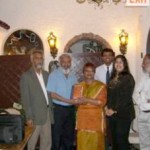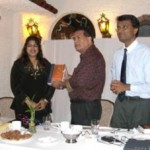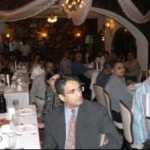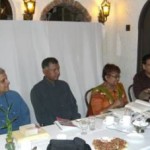NY Launch- Keynote By Dr Prem Misir
PRESS
BOOK LAUNCH In New York.
The Keynote Address By Dr Prem Misir, Pro-Chancellor, University of Guyana
HINDUPHOBIA: ETHNOCENTRIC WRITINGS ON INDIC THOUGHT
BY PREM MISIR
The Indo-Caribbean Council of New York invited me to deliver the keynote address and to launch the book “Invading the Sacred: An Analysis of Hinduism Studies in America” at the Villa Russo in New York on July 23, 2007. I now present an abridged version of my address.
”This evening at the historic Villa Russo I have the honor and privilege to launch this book, “Invading the Sacred: An Analysis of Hinduism Studies in America”, by Krishnan Ramaswamy, Antonio de Nicolas, and Aditi Banerjee (Editors), in the shadow of impending cultural genocide; a genocidal process actively at work that labels Sanatan Dharma as oppressive, destructive, and evil. This is well orchestrated deception; and culpability for institutionalizing this lie lies with the American Academy of Religion. This deception constitutes anti-Hindu propaganda and amounts to Hinduphobia.
And this, indeed, is ethnocentrism where the American academic establishment on religion pronounces on Hindu culture through the standards of their own Western rationality and culture; and this is morally inappropriate with little scientific integrity. The way of preventing ethnocentric behaviour is to judge a people’s culture from their point of view; and the alternative to ethnocentrism is cultural relativism, a method of passing judgment on a culture by its own standards. Ethnocentrism prevails when there is unfamiliarity with a culture; and clearly, this is the case with the way the minority American establishment on religion interprets Hinduism.
Some illustrations of this American academic establishment’s propaganda include the following: the Bhagavad Gita as “a dishonest book” that promotes war; Ganesh’s trunk as a “limp phallus”; Shiva as “a notorious womanizer”; the bindi as a glob of menstrual blood; and the “ha” in mantras as a woman’s wailing when experiencing an orgasm.
Unfortunately, many Hindus are cowed uncomfortably into conceding these anti-Hindu statements because they are concerned that they may be under further attack; believing that conceding is the way to seek peace.
At any rate, this behaviour on the part of Hindus is a denial of Hinduphobia; in addition, Hindus see these offensive remarks as an illustration of and testimony to their tolerance; it is al most an expression of pride to believe that they are expressing tolerance. But this kind of behaviour is akin to the Stockholm Syndrome where the victim (Hindu) tries to win the trust of the aggressor (American academic establishment), the Hindu tries to please the aggressor, the Hindu ends up identifying with that aggressor, and then starts to believe that the aggressor actually is in the Hindu’s corner.
This Stockholm Syndrome reaction is a response to domination. Just as how we have a commercial economy with a market where different firms compete, we also have a religious economy with a market (aggregate demand for religion) and firms (different religious organizations). In the commercial economy, many industries compete for the top prize; this is no different for religions.
Many religious organizations attempt to secure a monopoly and a dominant position in the religious economy. In fact, the American academic establishment on religion attempts to dominate and denigrate Hinduism; clearly, this U.S. establishment on religion attempts to be the final arbiter on the interpretation of Hinduism, albeit, an erroneous interpretation.
You may very well ask why this denigration of Hinduism is happening. The Hindustan Times of India on June 28, 2007, noted that India does not cater for religion as a serious academic discipline because of the belief that knowledge about religion may give rise to communalism; and so India contributes minimal research on Indian religions. This vacuum enables the U.S. to produce considerable research on Hinduism. The point is that paucity in India’s research on Hinduism makes way for the American establishment to call the shots on the interpretation of Hinduism. In this way, the establishment defines who Indians are. And so India has to take some blame for this Western denigration of Hinduism.
The American Academy of Religion’s research findings input U.S. government policy, both nationally and internationally. Further, India is now a global player in politics and economics; and so there is need to interpret the American Academy of religion’s denigration of Hinduism against this context.
But India and its Diaspora immediately can address this vacuum. And, indeed, for Western scholars as stakeholders in this ‘denigration’ process, this book “Invading the Sacred: An Analysis of Hinduism Studies in America” is a timely response to erase the vilification.
Guyana, a recipient of one of the largest batches of Indians as indentureds from India, already is experiencing the same denigration of Hinduism in much the same way that the American establishment is highlighting in the U.S.
One manifestation of this vilification in Guyana is the activation of an increasingly aggressive ‘conversion’ process to persuade Hindus to become Christians. The act of converting a person implies that that person needs some kind of ‘salvation’ from something that is undesirable, something that is heathen; in fact, use of persuasion in the conversion of a Hindu, indeed, would require a derision of that person’s religion. This act of conversion smacks of ethnocentricity.
And not long ago, a book “The Cycle of Racial Oppression in Guyana” by Kean Gibson claims that Indians oppress Africans in Guyana through the Hindu caste system. The oppression, the author noted, is motivated through Indians’ desire to secure and sustain power.
A justification for oppression, according to Gibson, is the use of the dualism of good and evil where Hindus see themselves as good, and perceive Africans as evil because of the latter’s black skin color.
In fact, Gibson believes that the People’s Progressive Party/Civic (PPP/C) has an agenda to create a racial state based on racial criteria, which could result in the extermination of Africans in the same way that Hitler attempted to eliminate Jews in Germany. What are we to make of these sweeping statements?
The essence of Gibson’s book is that Hinduism through the caste system legitimizes racial domination of Africans. Clearly, Dr. Sarvepelli Radhakrishnan and Swami Chinmayananda’s explanations of the caste system as applied in Hinduism cannot and will not support the view that Hindus perceive Africans as evil on the basis of Gibson’s assumption that Africans are from the lowest caste.
The lowest caste can move to the highest caste through action, and each caste is not competing against one another, but infuses cooperative elements among each other. Gibson fails to present the philosophical implications of the varnas in expounding the societal division of labor in Hindu theology. Indeed, Gibson may have very well advanced Hinduphobia in the Caribbean; but without an understanding of the historical continuity of Hindu civilization, Gibson’s denigration is not on solid foundation.
Review the remarkable continuity of Hindu culture through the eyes of Professor Arthur Macdonell, Professor Max Muller, and Pandit Jawaharlal Nehru.
Professor Arthur Macdonell of Oxford University in his History of Sanskrit Literature, notes that “…in spite of successive waves of invasion and conquest by Persians, Greeks, Scythians, Mohammedans, the national development of the life and literature of the Indo-Aryan race remained practically unchecked and unmodified from without down to the era of British occupation…No other country except China can trace back its language and literature, its religious beliefs and rites, its dramatic and social customs through an uninterrupted development of more than 3,000 years.”
Professor Max Muller of Oxford University in lectures at the University of Cambridge said: “…And if I were to ask myself from what literature we here in Europe, we who have been nurtured almost exclusively on the thoughts of Greeks and Romans, and of one Semitic race, the Jewish, may draw the corrective which is most wanted in order to make our inner life more perfect, more comprehensive, more universal, in fact more truly human a life, not for this life only, but a transfigured and eternal life – again I should point to India.”
Speaking of the date for the introduction of the Rig Veda, Pandit Jawaharlal Nehru notes: “…it is probable that this literature is earlier than that of Greece or Israel, that, in fact, it represents some of the earliest documents of the human mind that we possess…behind the Rig Veda itself lay ages of civilized existence and thought…”
And so we ask, why distortions to the Hindu culture continue, when the unbroken chain of today’s culture connects that earlier period of about seven thousand years ago when the Indus civilization began? The excavations in Mohenjodaro and Harappa in 1922/23 attest to this earlier Indus civilization prior to the arrival of the Aryans. Hindu culture, therefore, is on genuine foundation.
And so “Invading the Sacred: An Analysis of Hinduism Studies in America” is a timely and superlative response to the distorted rewritings of the history of Hindu culture and civilization. This book, in answering the distortions, definitively, is in the spirit of promoting an appreciation of cultures in the pursuit of a fundamental unity of all peoples, clearly a necessity in today’s multiethnic world. Invading the Sacred stands tall and honorable against the ethnocentric writings on Indic thought.”
-X-
For launch info & pictures, pls. see-
http://narthaki.com/info/rev07/rev488.html
Launch of ‘Invading the Sacred’ – A book that matters
– Bhasyam G Iyengar, NYC
e-mail: biyengar333@yahoo.com
Photos courtesy: Kali Group
August 7, 2007
Scholars, thinkers and writers debate and discuss at Villa Russo
Richmond Hill, Queens, NY: July 23, 2007:
Excerpts—
(L-R) Prof Roop Persaud, Ramesh Kalicharran, Pandita Indrani, Krishnan Ramaswamy, Aditi Banerjee, Bhasyam Iyengar at the launch The gathering at the launch
The serene launch event at the elegant hall of Villa Russo, 101-12 Ave and Lefferts Blvd, Queens, NY, was brisk and professional. It was jointly sponsored by The Indo-Caribbean Council (ICC) and Association of Artists and Writers, Inc, Queens, NY. The occasion was further invigorating with the presence of Dr. Prem Misir, Pro-Chancellor, University of Guyana, Ramesh D Kalicharran, International Coordinator, Indo-Caribbean Council, Rajiv Malhotra, Infinity Foundation, Rev. Seopaul Singh, Advisor, Guyana Journal and Advisory Trust, ICC, from Association of Artists and Writers, Hon. Dr Taj Rajkumar, District Leader, New York State Assembly District 31, Haji Zakir, Advisory Trust, ICC and many more knowledgeable participants. Dr Prem Misir spoke about the book and the occasion. His observations were received with much cheer and aplomb.
Dr Prem Misir launches as editors, Aditi Banerjee (L) and Krishnan Ramaswamy (R) share the moment Rajiv Malhotra (left extreme) and Dr Prem Misir (right extreme) at the Panel discussion
What the eminent say about ‘Invading the Sacred’
The essays in the volume reignite a debate which has politico historical antecedents.
-Kapila Vatsyayan, Academician and Member of Rajya Sabha
This book is a true eye-opener…
-Pt. Rajan Sajan Misra
This book is in the spirit of promoting an appreciation of cultures in the pursuit of a fundamental unity of all peoples…Invading the Sacred stands tall and honorable against the ethnocentric writings of Indic thought.
-Prem Misir, Pro-Chancellor, University of Guyana
The perspectives and sensitivities of Hindus (should) be considered in the presentation of Hinduism in scholarship, textbooks and the media. What is remarkable is that many western academics are so resistant to it.
-Nathan Kartz, Prof. of Religious Studies, Florida International University
Hate speech against minorities has resulted in attacks upon them…Leaders and thinkers in the UK should invite debates and discussions…in the greater endeavor to create a truly diverse and pluralistic society.
-Lord Rana, Member of the British House of Lords
American scholars who do not have enough knowledge about a culture and religion should not write about it.
-Pt. Jasraj
Modernism is not culture-free, neither is Social Science: so, a work like this might well advance our trove of knowledge of the real world of ideas and practices, and also of the biases inherited via the long legacy of EuroModernism.
-Rajani Kannepalli Kanth, Visiting Fellow, Harvard



